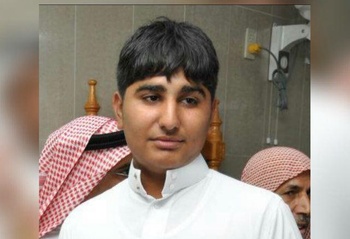For the mothers of six Shia youths condemned to death by beheading in Saudi Arabia, the “terrible silence” from the Sunni kingdom’s rulers over their sons’ fate continues. But for one family the pain of not knowing what will happen next has been cruelly heightened.
Abdullah al-Zaher was just 15 years old when he was arrested in 2011. His death sentence was confirmed in October under Saudi Arabia’s draconian anti-terror laws. The following month, Mr al-Zaher was transferred to a prison in the south of the kingdom.
For more than four weeks, his family heard nothing. They feared the worst – that he had been executed without their knowledge – especially as other families had continued to receive short weekly phone calls from their sons.
It was only this week, on 29 December, that they finally received a call from him. It lasted for barely two minutes but at least it told them he was still alive.
Mr al-Zaher’s mother, Fatima al-Ghazwe, said: “Abdullah’s situation was not clear because the call was so short and he can’t say anything.”
She added that the Saudi authorities had still provided no explanation for Mr al-Zaher’s transfer, though it came shortly before The Independent reported a growing expectation of a planned simultaneous mass execution of more than 50 individuals, including the six youths, in late November. The state killings were said to have been planned to take place in several cities across the kingdom. Citing the fact that her family had not seen Mr al-Zaher for more than three months, his mother said: “Our situation is bad, we are always worried and we are always thinking what may happen.”
The other young death row detainees are being held in solitary confinement in Riyadh’s Al Ha’ir prison. Their sentences for alleged terrorist activities were also confirmed in October. The families maintain that the only crime committed by the young men was to be involved in pro-democracy protests, calling for equality in a country that routinely discriminates against its Shia minority.
Despite their fears, the families remain optimistic that a dramatic reversal of the decision to execute the six men may come. In a letter, the mothers of the six, together with the mother of a prominent Shia cleric, Sheikh Nimr al-Nimr, also sentenced to death, wrote this week that, as 2016 begins, “our children will have spent nearly four years behind bars”.
The letter said: “They will have spent nearly 90 days in solitary confinement after the court affirmed the final verdict. They could be beheaded at any moment. Their bodies have become weak. They have all suffered due to anxiety, loneliness and anticipation of an unknown fate.”
The mothers wrote of their anguish at being deprived of their loved ones and of their deep anxiety for their sons’ well-being, “especially during the holiday season where families gather”. But they added that international interest in the case in recent weeks has “motivated many people around the world to join our cause, and successfully helped the cases to reach the highest levels”.
Despite the lack of official Saudi comment, the mothers said: “We are sure that your support has a deep impact and could indeed help save our children from death.” They say that confessions were extracted under torture, that the accused have been denied legal counsel and that the trial judges were clearly biased towards the prosecution.
The Saudi government denies those claims, but independent observers and international human rights organisations have strongly argued that the process that led to the convictions and resulted in the death penalties was deeply flawed. The mothers said their sons were, in peacefully protesting, merely exercising a “fundamental and legitimate right in the modern world”.
Nosra al-Ahmad, the mother of Ali al-Nimr – who, like Mr al-Zaher, was a juvenile at the time of his arrest – said that she had received no indication from Saudi authorities that the death sentence might be commuted. Their lack of response was, she said, “a terrible silence”.
The fact that, thus far, no one has been executed for the same terrorism offences as the six men gives their families a slender hope that their loved ones may yet be spared. “We are wanderers between fear and hope,” Nosra al-Ahmad told The Independent. “And we are waiting for this tragic situation to change, and to be released from this injustice.”
/149

